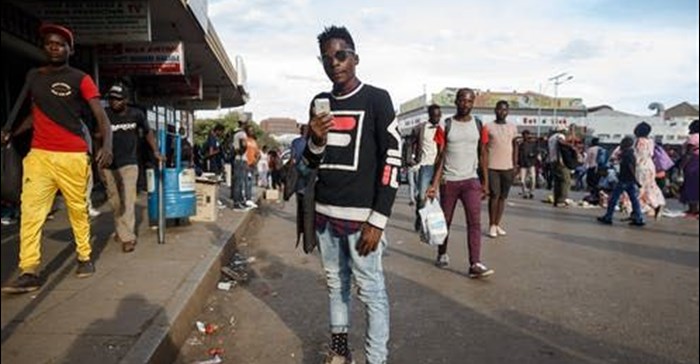How apps on mobile phones are changing Zimbabwe's talk radio

Like the rest of the world, African radio is breaking away from being an analogue communication tool that relies on top down information flows to one that relies on multiple feedback loops. The main driver of this is digital media technologies.
It’s a trend I examine in a paper called Mobile Phones and a Million Chatter: Performed Inclusivity and Silenced Voices in Zimbabwean Talk Radio. I wanted to observe what is really happening at the convergence between radio, smartphones and related mobile-based applications such as WhatsApp, Facebook and Twitter.
I found that apps like WhatsApp have indeed grown public discourse by connecting more voices to participate in live talkback radio – but this came with new challenges as newsrooms experience an oversupply of digital information from audiences.
A radio station in Harare
I set out to study a local radio station in Harare, the capital of Zimbabwe through live studio ethnography and sustained interviews with radio producers and 21 audience members, the latter largely working class Harare residents.
Unsurprisingly, both producers and audiences found the convergence between radio and mobile phones is stretching out the communicative space. It allows more inclusive, seamless and real time debate between radio hosts and audiences. There was a strong feeling that radio continues to inculcate a sense of imagined community. One producer said:
Because we have a dedicated mobile line for WhatsApp, our programme has grown a bit in popularity and we know some of our listeners in person. Some of them visit us during the day just to explain a point discussed in the previous show or even to give us story leads.
I tune in to radio through my mobile phone while I am selling vegetables on the market. I know that my neighbour is listening to this show also.
Prior to the emergence of digital media technologies, land lines were expensive and not nearly as widely domesticated as mobile phones are today.
Read more: Radio in Ghana: from mouthpiece of coup plotters to giving voice to the people
By 2017, WhatApp was already by far the most popular app in Zimbabwe. It accounts for up to 44% of all mobile internet usage in a country where 98% of all internet usage is mobile. According to Postal and Telecommunications Regulatory Authority of Zimbabwe, promotional WhatsApp and Facebook access bundles, marketed by the country’s mobile operators, are helping drive up use of these platforms.
The digital downside
However, there’s also a downside to the advent of digital media technologies and digitalised newsrooms. Observing live studio shows I witnessed a number of structural constraints.
For example, while radio audiences may celebrate the possibilities of easily sending critical questions via WhatsApp to studio hosts, an apparently unintended consequence was that the journalist managing live studio debates struggled to read out all the messages received. The studio WhatsApp number commonly becomes congested.
Some messages and comments are left unread and get buried under an avalanche of newer ones popping up on the screen, in turn buried under even newer ones. Once this happens, it’s hard to tell how many quality contributions have been lost by not being read. So not all voices reaching the studio get a fair chance of being heard.
I call these unintended constraints, though, because they are not necessarily a result of failure by journalists and producers. They are more a technical setback in which an oversupply of information via dedicated WhatsApp lines eluded even the most astute radio presenter.
Read more: How community radio has contributed to building peace: a Kenyan case study
In addition, some messages reaching the studio WhatsApp channel were so badly typed that they would be set aside, the journalist preferring to read out only well-typed messages. Newsroom pressures and deadlines associated with broadcast media mean that there isn’t the luxury of spending too much time on one question.
In mass communication studies, these are seen as exclusionary practices in live radio talkback shows.
Democratising the airwaves
Democracy is normatively seen as thriving in environments where all voices, opinions and views across diverse population profiles are respected and given a fair chance of representation.
My study showed that, at least in terms of volume, the convergence between radio and mobile phones is stretching out the public sphere to accommodate more voices.
Digital technologies are allowing for new participants to engage actively with radio.![]()
Stanley Tsarwe, Journalism Lecturer, University of Zimbabwe
This article is republished from The Conversation under a Creative Commons license. Read the original article.
Source: The Conversation Africa

The Conversation Africa is an independent source of news and views from the academic and research community. Its aim is to promote better understanding of current affairs and complex issues, and allow for a better quality of public discourse and conversation.
Go to: https://theconversation.com/africaAbout Stanley Tsarwe
Journalism Lecturer, University of Zimbabwe.Related
EXCLUSIVE: Scopen research - Be integrated, AI-powered and strategic, or be left behind 20 Mar 2025 Inaugural Community Radio Awards celebrates local broadcasting 17 Mar 2025 South Africa to remove luxury duty on lower value smartphones 12 Mar 2025 How radio connects and empowers South African communities 12 Mar 2025 Icasa boosts community radio with spare spectrum, applications now open 27 Jan 2025 2024 in-app purchase revenue up to $150bn, but app downloads decrease 23 Jan 2025























